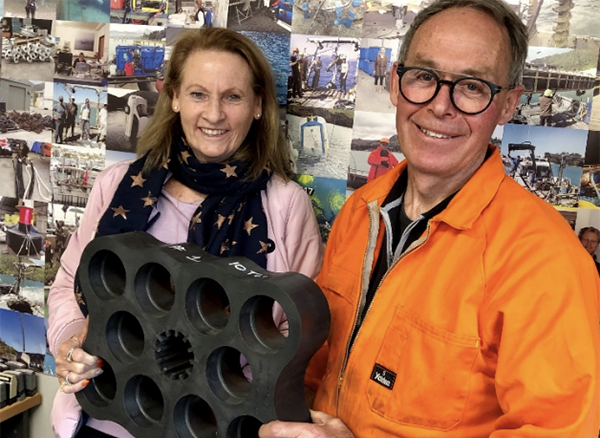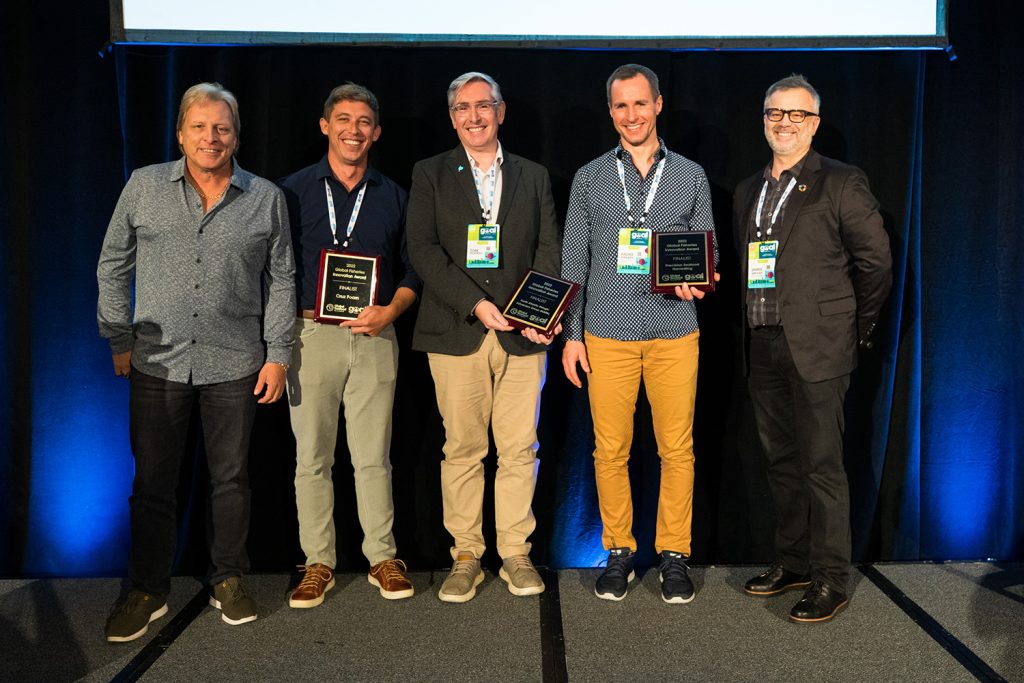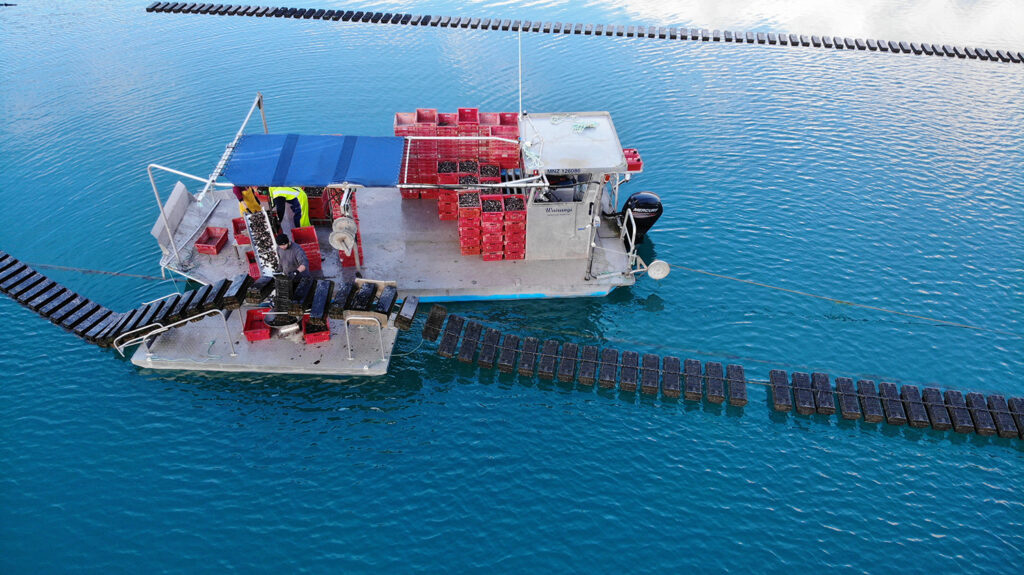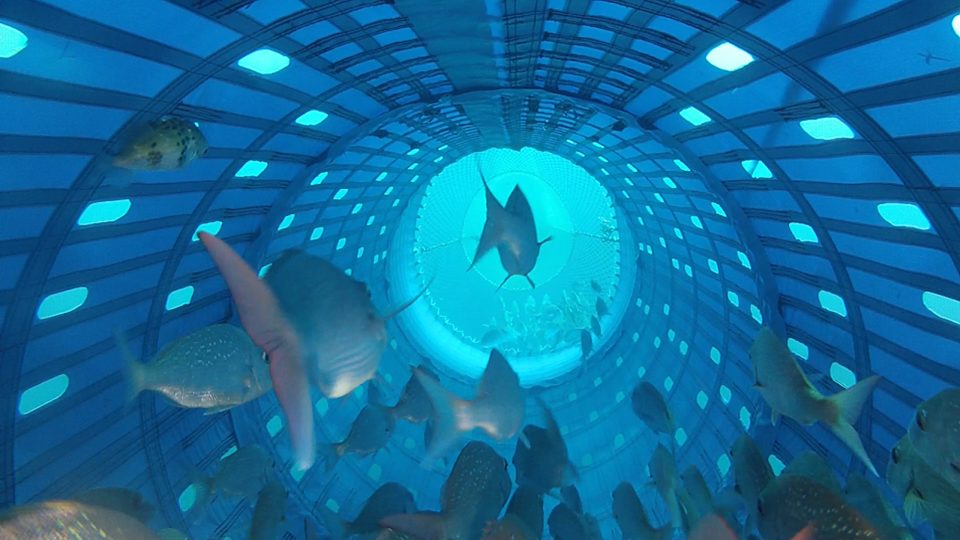Marine Flex’s rubber cables are a ‘big improvement’ on traditional heavy chains that damage marine life and seafloor

Marine Flex, a New Zealand company that’s developed a mooring and anchor system that reduces the impact on the seabed under marine farms, boats and jetties, has received a 2023 Cawthron Marlborough Environment Award Winner in the marine category.
Marine Flex’s rubber cables are a big improvement on conventional heavy chains that sweep the seafloor and impact marine habitats and sea life. Traditional moorings use a concrete block with a chain attached to keep the boat or structure in place. The chain sweeps across the seabed, slackening or tightening depending on wind, waves and currents, damaging marine habitats and organisms.
Marine Flex provides a solution to this – the rubber cables do not come into contact with the seafloor. They are attached to a specially designed screw anchor that penetrates the seabed with less disturbance and greater holding capacity than conventional systems. The Marine Flex mooring system is sold around the world.
“The Marine Flex team is proud of winning the Marine Category of the Cawthron Marlborough Environment Awards 2023,” wrote the company on LinkedIn. “Preserving the ocean is one of our core drivers. We look forward to expanding our contribution by increasingly applying our solutions worldwide.”
Aquaculture in the Marlborough Sounds is one of their markets. The Marine Flex mooring and anchor system holds mussel farms in place and a GPS location and installation system ensures they do not move beyond their legal boundary.
Marine Flex has also been used in the Sounds for jetties, pontoons and to secure the underwater classroom at Lochmara Lodge. This alternative to piles causes less damage to the seafloor, avoids biofouling and is less visually obtrusive.
Sonar seafloor mapping by Marlborough District Council has shown damage caused by traditional block and chain moorings. There are about 3,000 moorings in the Marlborough Sounds. As awareness grows and regulation comes in to protect seafloor habitats, Marine Flex offers a more environmentally friendly alternative.
The Cawthron Marlborough Environment Awards are held every two years to showcase businesses or community projects that are good for the environment. The awards are open to any businesses, community group or individual working in Marlborough, New Zealand. Judges look for entrants who protect and enhance the environment and use resources and energy efficiently.
The awards are run by a charitable trust and are supported by the Cawthron Institute, Marlborough District Council, the Department of Conservation and local sponsors.
Read the judge’s feedback here.
Follow the Advocate on Twitter @GSA_Advocate
Now that you've reached the end of the article ...
… please consider supporting GSA’s mission to advance responsible seafood practices through education, advocacy and third-party assurances. The Advocate aims to document the evolution of responsible seafood practices and share the expansive knowledge of our vast network of contributors.
By becoming a Global Seafood Alliance member, you’re ensuring that all of the pre-competitive work we do through member benefits, resources and events can continue. Individual membership costs just $50 a year.
Not a GSA member? Join us.
Author
-
Responsible Seafood Advocate
[103,114,111,46,100,111,111,102,97,101,115,108,97,98,111,108,103,64,114,111,116,105,100,101]
Tagged With
Related Posts

Innovation & Investment
Cruz Foam, Aristogene Biosciences win GSA’s annual Innovation Awards
Companies with alternatives to polystyrene (Cruz Foam) and antibiotics (Aristogene Biosciences) take home the annual awards at GOAL 2022.

Innovation & Investment
FlipFarm’s semi-automated oyster-farming system wins the Global Aquaculture Innovation Award
FlipFarm Systems’ semi-automated method for oyster farming has won the Global Seafood Alliance’s annual Global Aquaculture Innovation Award.

Fisheries
‘We were just looking for a way to fish better’: How one partnership is reinventing commercial fishing nets to reduce bycatch and improve animal welfare
Precision Seafood Harvesting’s novel reimagining of commercial fishing nets provides innovative solutions to both bycatch and animal welfare issues.

Fisheries
‘Regulation is pushing toward greenifying materials’: How one innovator is upcycling seafood waste into biodegradable packaging foam
GOAL 22: Cruz Foam’s biodegradable packaging foam made with shrimp shells is a finalist for GSA’s inaugural Global Fisheries Innovation Award.



